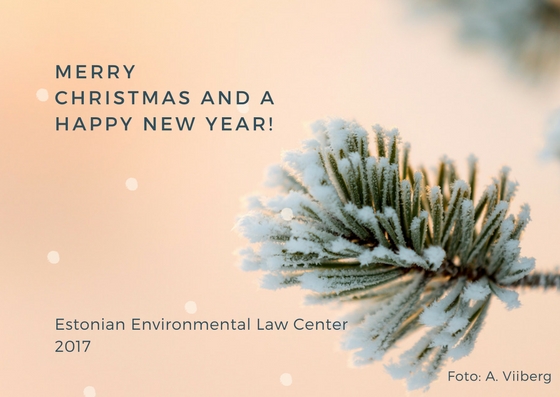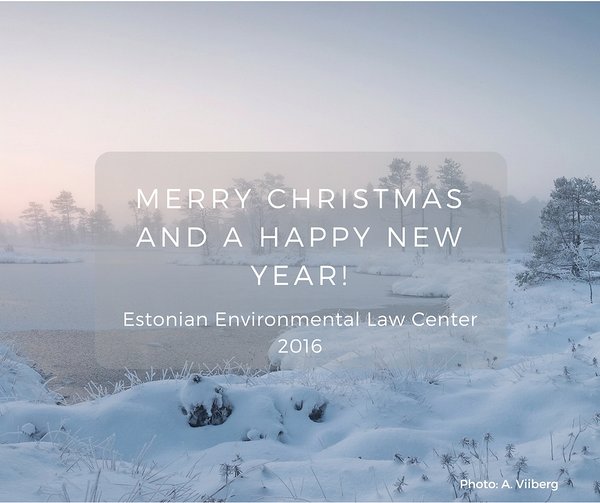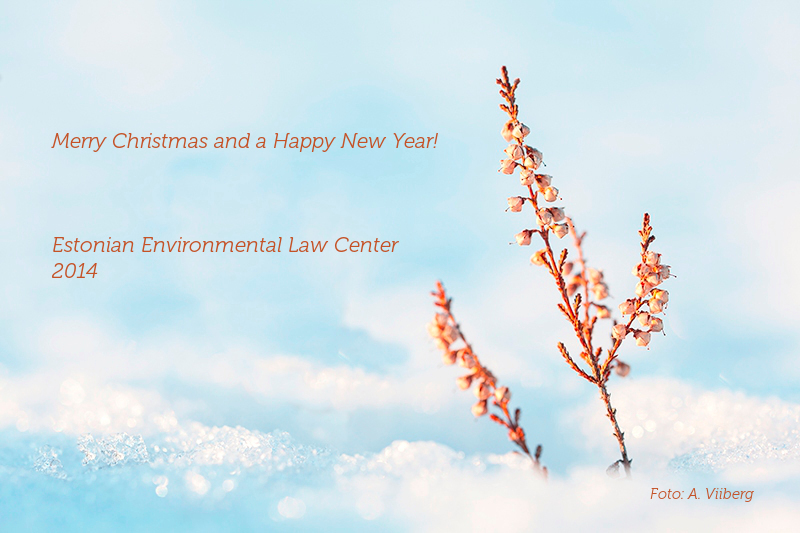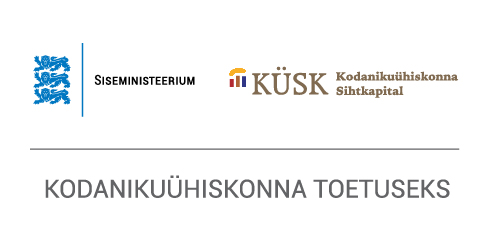-
During 2017 - 2021 Estonian Environmental Law Center (EELC) together with partners worked on enhancing the discussion between the local communities, landowners and officials and search for solutions to the problems arising from the established restrictions on Natura 2000 areas. EELC’s role in the initiative was to provide legal advice in possible conflicts between the local communities, individuals and authorities.
Read more » -
Joyous Christmas time and Happy New Year! Read more »
-
Estonian Environmental Law Centre had a summer-intern from France this year - Delphine Saint-Martin. She acquires her Master's degree in International Law and Human Rights at the University of Tartu.
Read more » -
Last week, the district court in Estonia suspended the construction permit of a shale oil [1] plant issued by local government in NE-Estonia for state-owned energy company Eesti Energia. The suspension is valid until the final decision in the case.Read more »
-
Today, 24 European civil society organisations sent a common letter to the European Commission, highlighting and inquiring about the controversies regarding Estonian Government’s investment in and plans to expand the shale oil sector, in relation to EU-related agreements and funds.
Read more » -
At the end of March, the Government of the Republic of Estonia decided [1] to provide 125 million euros in aid to the state-owned company Eesti Energia for the construction of a shale oil plant. Estonian environmental organisations consider the government’s decision irresponsible in light of the ongoing pandemic, Estonia’s future and the EU’s climate goals.
Read more » -
Client Earth lawyers have launched a guide to assist legal professionals and organisations in Europe take legal action to protect the environment. The guide highlights the EU-level legal framework which allows members of the public to challenge violations of environmental law.Read more »
-
The Aarhus Convention, which was signed in 1998 and entered into force in 2001, has represented something quite incredible from its very first inception, namely an instrument linking environmental rights and human rights. The Convention is essentially built on three pillars: (1) access to information; (2) public participation in decisions on specific activities; and (3) access to justice.
Read more » -
Since January 1, Estonian Environmental Law Center (EELC) has become a full member of Estonian Council of Environmental NGOs (EKO) having previously passed the 6-month candidate member period. In the past years EELC has worked closely both with EKO and its members on a number of projects in environmental law competence. These include proposals for amending specific legislation (e.g., Nature Conservation Act), as well as several trainings (e.g., on environmental decision-making and general environmental law) and legal assistance to EKO members in environmental matters.
Read more » -
In cooperation with EU and global NGOs Justice & Environment and Client Earth we will strive to improve public’s access to justice in environmental matters through EU-funded LIFE project „Education and Awareness Raising of Legal Professionals on Access to Justice”. In addition to Estonia, the partner countries of the project are Hungary, Spain, Austria, Germany, France, Poland and Slovakia.
Read more » -
EELC welcomes its new lawyer - Merlyn Mannov - who joined our team in October.
Merlyn received her Master’s degree (cum laude) from Faculty of Law in Tallinn University in 2017. She has previously worked as a lawyer in a private law office.
Read more » -
Since the middle of the 20th century the world has encountered many ecological problems (e.g. the energy crisis in the USA, desertification, spread of alien species, etc) and anthropogenic crises like, for example, the Chernobyl; we have also become to understand the limitation of resources and developed our scientific knowledge. All this has shown us the need to take into account the environmental impact caused by humans. The idea that society could exist without the natural environment is already changing. Nevertheless, environmental impact assessment is still in constant need of improvement.
Read more » -
In April, the European Commission adopted a new action plan for halting the loss of biodiversity by 2020. In 2016, many environmental organisations across Europe worked hard to direct EC toward better implementation of the Nature Directives instead of changing them. In November 2016, EELC together with the Estonian Council of Environmental NGOs sent a letter on this to Andrus Ansip, the Vice-President of the European Commission. In January 2017, as a member of the network Justice and Environment (J&E) we submitted the proposals to EC on the future Nature Action Plan. These proposals were based on the legal analysis composed by J&E, the results of which suggest that in member states there are significant gaps in the so-called appropriate assessment of new development projects.
Read more » -
Dispute settlement is often more efficient solution to legal disputes than having them solved in court battles. Therefore, EELC considers it important to increase the number of its cases where disputes are resolved by a mutual agreement of the parties. For that purpose we have just launched a project titled “Enhancing the EELC team’s negotiation skills”. The project is financed by Estonian National Foundation of Civil Society and Ministry of the Interior.
Read more » -
EELC has recently contributed to a study in cooperation with Germany and Poland, which analysed implementation and impact of EU policies and legal regulation influencing the protection and restoration of peatlands. The main assessment areas were nature protection (Natura 2000) and infrastructure planning, EU water policy, agriculture (Common Agricultural Policy), rural development and structural funds, and LIFE energy policy, and climate change regulations. The study presents key findings and recommendations for each area.
Read more » -
As a member of Justice and Environment (JE) and its leading body of Natura topic, we have called on the European Commission on how to better implement EU Nature laws which is motivated by REFIT and an analysis that JE has carried out.
Read more » -
We’re happy to let you know that Katre Liiv joined EELC team in October as our new communications officer.
Read more » -
Justice and Environment (J&E), network of environmental law NGOs has just published a newsletter which has in its focus the long-awaited study ordered by European Commission evaluating the “regulatory fitness” of the EU Nature Directives. The almost 700-page study concludes that the Directives are fit for purpose, providing a good framework for achieving EU biodiversity policy goals. However, the study also concluded that there a number of challenges concerning the assessment of impacts that projects may have on Natura 2000 sites.
Read more » -
Last week, a workshop organized by the European Commission took place in Brussels in which experts from different countries shared their experience with the application of Strategic Environmental Assessment Directive (2001/42/EC, so-called SEA Directive). Both academics, as well as practitioners from private and public sector, took part in the seminar. Siim Vahtrus of EELC participated as a representative of Justice & Environment network.
Read more » -
Last week the annual general meeting of the network Justice&Environment (J&E) took place in Bratislava. Among other issues, a new member from Bulgaria – an organization called Bluelink – was accepted to the network. From 2016, Slovak organization Via Iuris is also actively taking part in our activities again.
Read more » -
EELC has compiled new guidelines that help the local communities and people living near the (planned) mining areas participate in the mining decisions. The guidelines point out what impacts should be pointed out to the mining enterprises and authorities and how to protect public and private interests in the mining permit procedure.
Read more » -
Estonian environmental NGOs (including EELC) have sent their comments and proposals about the draft of oil shale development plan 2016-2030 to the Riigikogu (the Estonian Parliament). The development plan currently on the table is not sustainable – it does not take into account all the impacts and cannot be considered a future vision of a smart country. The environmental organizations hope that the members of the Riigikogu shall halt the discussions of the development plan that extensively damages the environment and quality of life, and require the Government to substantially upgrade the plan.
Read more » -
At the end of 2014 EELC composed an analysis about the possibilities of spatially planning for the use of mineral resources and opening new areas for mining. The main conclusion was that the coflicts concerning the opening of mining areas should be resolved already in the county land-use plan (i.e. plan that is established to guide land use in each of 15 counties in Estonia). Earlier this year, as a follow-up activity, we concluded an assessment of the county plans currently drafted in all counties. The aim was to assess whether and to what extent the practice of mineral resources usage and opening new mining areas would change if the new plans would be established in their present form.
Read more » -
At a conference held in Brussels in November 2015, experts commissioned by the EU introduced the results of the analysis on the need to update the Birds and Habitats Directive. The event was also attended by Siim Vahtrus, a representative of network Justice&Environment.
Read more » -
In October the European Environmental Bureau (EEB), a network of European environmental organisations, held its annual public conference in Brussels. The conference was followed by the general meeting of the organization, where Siim Vahtrus from EELC participated in the role of chairman of Justice&Environment (J&E).
Read more » -
EELC has engaged in public participation issues in environmental matters from its founding days. We have published guidelines both for citizens and officials to increase their knowledge and skills in this field and dealt with participation in many environmental decisions. As a continuation of our activities, we launched a new tool to assess and compare opportunities of public participation in environmental decision-making processes this autumn. The starting point for the new tool are the guidelines issued in the end of this summer „Public Participation and Disclosure of Environmental Information“.
Read more » -
EELC has published an analysis on impacts of TTIP on the European Union and Estonian law (available in Estonian only). The analysis concludes that parts of the trade agreement are in conflict with Western legal principles. In the longer perspective, it may lead to lowering the standards both in EU chemical and food safety laws as well as in a wider spread of genetically modified organisms.
Read more » -
EELC is happy to introduce a new junior lawyer - Kadi-Kaisa Kaljuveer - who joined the team this September.
Read more » -
EELC has compiled new guidelines that help public officials better understand the international and EU law requirements for disclosure of environmental information and effective engagement of public in environmental decision-making. Legal requirements that are often complex and/or abstract, have been explained and illustrated with practical examples by EELC’s lawyers.
Read more » -
In July, EELC introduced the guidelines for public participation aimed at ordinary citizens and NGOs. The first version of the guidelines was issued already in 2012. This year the new (Spatial) Planning Act entered into force in Estonia and, therefore, the guidelines needed an update.
Read more » -
In May EELC’s office got a Green Office Certification issued by the Estonian Association for Environmental Management (EKJA). EELC now belongs to the selected few office teams who systematically follow the environmentally friendly principles and practices in their daily work and office activities
Read more » -
Starting from 13 April the EELC team works at a new address, located at 42 Kastani str, Tartu 50410. Our landline and mobile numbers as well as e-mail addresses remain the same. Read more »
-
Estonian Environmental Law Center recently published two analyses that demonstrate that the obligations imposed to companies in mining permits are often vaguely worded and recommendatory, leaving local communities and the environment in harm’s way. New mines and quarries are permitted without considering other values, developments and potential mining areas in the area.
Read more » -
European Commision has recently kicked off drafting of the new list of EU Projects of Common Interest (PCIs) in the field of energy by publishing the candidate list for 2015. Projects that are in the end of the process designated as PCIs will receive special funding from the EU. Member States must foster their realization by fast-track permit procedures. Justice&Environment, a network of environmental law organizations, reminds the decision-makerst that public must be included in drafting the new list.
Read more » -
Attentive visitors of EELC website have already discovered that we have made significant changes. Changes to the layout and structure of the webpage were mainly driven by our wish to make the web page more user-friendly, info easier to find and our social impact better seen.
Read more » -
An article on general environmental obligations of operators written by Siim Vahtrus (EELC) and Hannes Veinla (Tartu University) was recently published in the European Energy and Environmental Law Review“ (Kluwer Law International).
Read more » -
Estonian Fund for Nature (ELF), Estonian Environmental Law Center (EELC) and Estonian Association for (Protection of) Mineral Resources (EMÜ) have signed a cooperation agreement to improve community involvement in the decisions concerning mineral extraction in Estonia.
Read more »



